How Can Austerian Zoran Milanovic Take Croatia Out of the Roundabout?
Adelina Marini, May 30, 2013
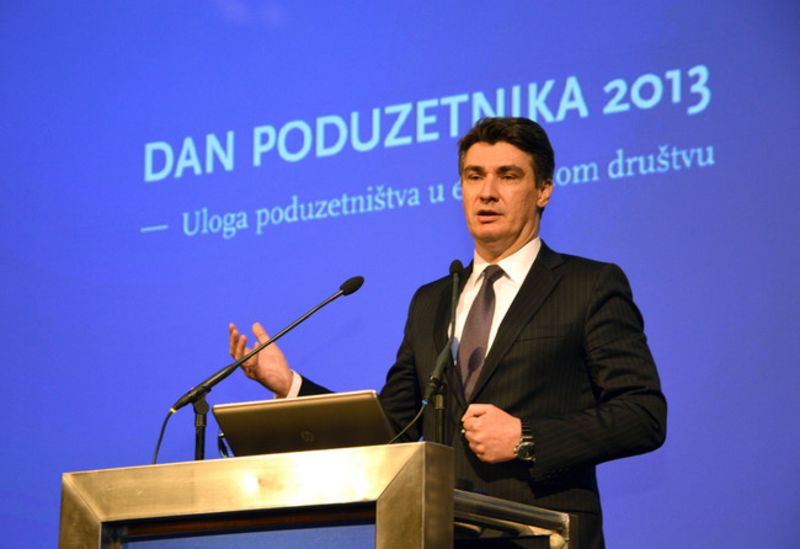 "Democracy is a wonderful thing while it's functioning. And it functions if people feel free and not less importantly, it is even the most important - if there is economic growth". This is why Croatia's Prime Minister Zoran Milanovic said in the end of the ProInvest tour - an initiative of the government aimed to boost public and private investments which was launched in the beginning of the year and consisted in touring the country's major cities and presenting before the local business the possibilities for investments and the measures the cabinet is undertaking to facilitate them. Local media commented, however, after the final meeting in Zagreb in the beginning of May, that the interest to the initiative was too weak. The hall where the event took place was half empty, but media and the government were not unanimous in interpreting that fact. According to the cabinet, simply the hall was too big, while media claimed the interest was fading.
"Democracy is a wonderful thing while it's functioning. And it functions if people feel free and not less importantly, it is even the most important - if there is economic growth". This is why Croatia's Prime Minister Zoran Milanovic said in the end of the ProInvest tour - an initiative of the government aimed to boost public and private investments which was launched in the beginning of the year and consisted in touring the country's major cities and presenting before the local business the possibilities for investments and the measures the cabinet is undertaking to facilitate them. Local media commented, however, after the final meeting in Zagreb in the beginning of May, that the interest to the initiative was too weak. The hall where the event took place was half empty, but media and the government were not unanimous in interpreting that fact. According to the cabinet, simply the hall was too big, while media claimed the interest was fading.
Whatever the truth, it is a fact that Croatia will be another sick man who will officially become a member of EU on July 1st 2013. In the words of Premier Zoran Milanovic himself, before the businessmen in the conference room of the Zagreb fair on May 8th, for the four years of crisis (and this year they will in fact become six), investments in Croatia have dropped by more than 40%. He believes, though, that this is both a weak spot, but also the key to potential recovery. But how is the big issue on which the prime minster and his government are getting more and more isolated. The opposition is blaming the cabinet of a lack of a clear strategy for economic recovery, the trade unions are getting more and more aggressive and hostile, protests and strikes are happening on a regular basis and people are becoming more and more apathetic.
At the debut elections for the European Parliament, the voter turnout was very low. At the first round of the local elections on May 19th, it was higher, but the outcome shows how uncertain the Croats are in fact. According to the latest poll by Ipsos Puls and Nova TV, 66.1% of the respondents do not trust the government, 24.2% trust the government, which is the lowest level since the beginning of its term. Moreover, polls show that 71.7% of the respondents believe that the direction in which Croatia is moving is wrong, while only 19 per cent believe that the country is moving into the right direction. It is interesting to note the different vision of the government and the employers precisely in terms of direction.
For example, Ivica Mudrinic, the chairman of the employers' union, said on the day of the entrepreneur (May 27) that the government was moving in a circle. "It is obvious that we have not chosen a high way or a fast lane, we have remained stuck in a roundabout which in the meantime got so 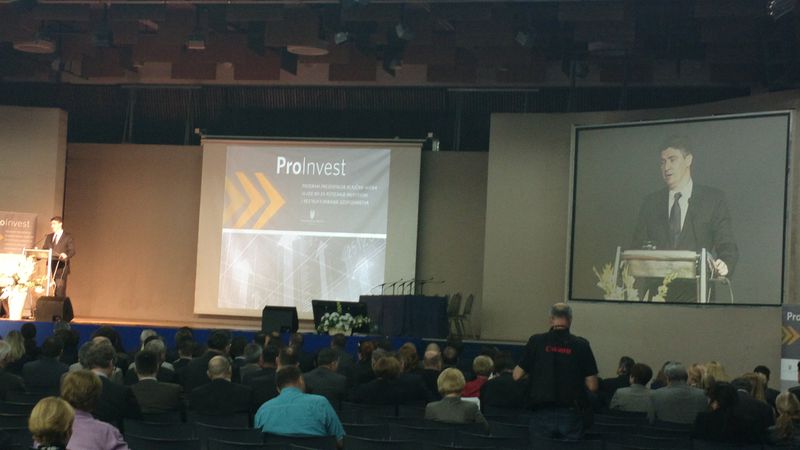 spoilt and is of holes all over making driving hazardous and a matter of survival". To this, however, the prime minister responded saying that the roundabout was actually a good news because it means that "we're still not off track".
spoilt and is of holes all over making driving hazardous and a matter of survival". To this, however, the prime minister responded saying that the roundabout was actually a good news because it means that "we're still not off track".
In an interview with this website, Dr Damir Novotny, an analyst with the T&MC consultancy firm, said that the biggest problem of Croatia's economy is the structure of the industry which is at the level of the 1950s. This is the so called fordist structure (after Henry Ford), which consists of mass cheap production. In the US, it was changed in the 1970s and in Europe it disappeared in the 1990s and since then the European economy has been in constant and continuous restructuring in the search of production with added value. In Croatia, regretfully, Dr Novotny says, production is not competitive and with low added value.
The reason, of course, is the lack of investments in technological equipment, which is due to a very interesting phenomenon, quite specific for transition states from post-communist-central-planning economies to market economy, especially when such a transition begins precisely in the epicentre of globalisation. According to Dr Damir Novotny, the problem with private capital in Croatia is that it is, in fact, not purely private, rather it is political. This means that in large Croatian industrial companies in which the state still has shares (for instances Podravka, known for the famous Vegeta), private capital does not behave the same way as in a company like Agrokor, owner of the biggest and most spread supermarket chain in Croatia Konzum.
Dr Novotny believes that in this company capital behaves quite normally while in the rest it behaves in a political way, meaning that it does not exert pressure on the company's management to raise productivity, to innovate, to invest. Instead, the only efforts of the company are aimed at keeping jobs which are already impossible to be maintained. And why has it come to such a situation the analyst explains with political clientelism. The new private owners received the shares from the companies in a political way, they did not buy them. That is why the political power requires them to protect the jobs and 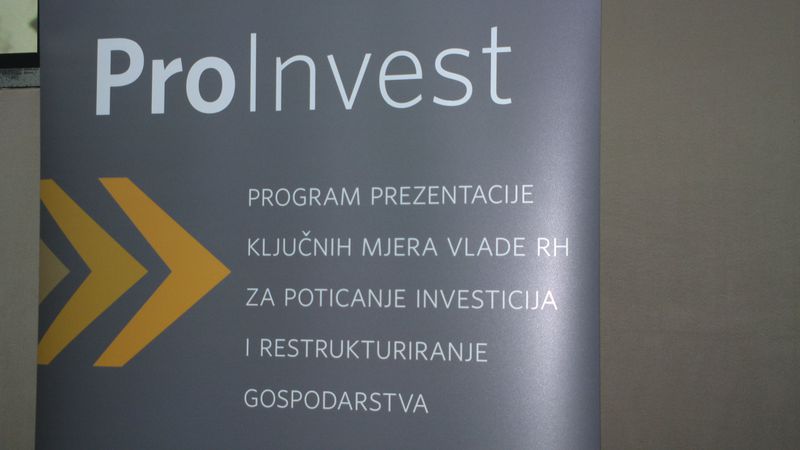 not to invest in new technology. And in today's environment these jobs are too many. Most affected from the "political capital" are the metal-processing and food-processing industries, the analyst says.
not to invest in new technology. And in today's environment these jobs are too many. Most affected from the "political capital" are the metal-processing and food-processing industries, the analyst says.
He, too, believes that the government's economic policy is not adequate because the cabinet does nothing to boost investments in the private sector, especially in small and medium-sized enterprises. On the contrary, it supports mainly the big enterprises which, however, cannot be competitive on the European market. Damir Novotny does not approve the ProInvest initiative because he does not see behind it any financial instruments. ProInvest is only a political initiative which is aimed at encouraging entrepreneurs politically, but it lacks fiscal tools.
The cabinet does not share this opinion. In the beginning of May, Deputy Prime Minister Branko Grcic, who is responsible directly for investments and making the economy move, announced that the biggest problem so far had been that the public sector grew in terms of employment, while in the private sector employment fell. That is why, a major priority would be fiscal consolidation. And if restructuring had started earlier, may be we would have been in a process of recovery, said then Mr Grcic. He also believes that there are financial resources - on the one hand there is potential in the form of credits from international financial institutions, the EU funds are also an option. The government is also looking for ways to boost lending through the banking sector.
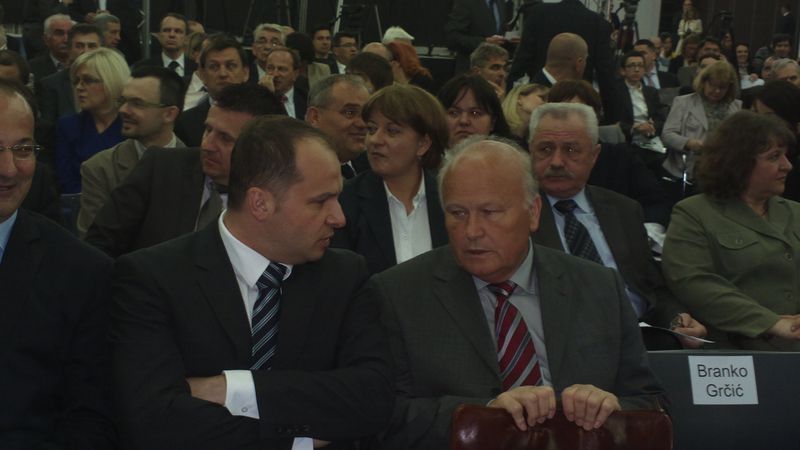 A major priority, however, remains reducing the deficit and therefore debt which is already too close to the ceiling of 60% of gross domestic product. With his numerous statements in response to criticism (mainly stemming from trade unions) that it is impossible to only save, Premier Zoran Milanovic often says that the government is not saving because saves someone who has more. We are limiting spending to prevent piling more debt up, he says thus fitting entirely into the group of austerians who believe that limiting public spending will help growth and recovery. This, of course, is a dispute that is taking place at the highest European level and there are still no signs of reconciliation between the austerians and spenders, of which euinside wrote in detail. But is Zoran Milanovic really an austerian, as he seems? In an interview for BBC's Hardtalk recently, the prime minister said that his government was the first to impose "some kind of austerity".
A major priority, however, remains reducing the deficit and therefore debt which is already too close to the ceiling of 60% of gross domestic product. With his numerous statements in response to criticism (mainly stemming from trade unions) that it is impossible to only save, Premier Zoran Milanovic often says that the government is not saving because saves someone who has more. We are limiting spending to prevent piling more debt up, he says thus fitting entirely into the group of austerians who believe that limiting public spending will help growth and recovery. This, of course, is a dispute that is taking place at the highest European level and there are still no signs of reconciliation between the austerians and spenders, of which euinside wrote in detail. But is Zoran Milanovic really an austerian, as he seems? In an interview for BBC's Hardtalk recently, the prime minister said that his government was the first to impose "some kind of austerity".
But Dr Novotny is not convinced. According to him, the spending cuts are not sufficient - no more than 300-400 mn euros were cut so far. More should be done because the deficit this year will exceed 3% of GDP. Nonetheless, he is of the opinion that it is necessary the belt-tightening policy to go hand in hand with a stimulating package. A good example, he says, of a balance between austerism and spendism is Austria. Although he believes that the Croatian economy is not ready for what awaits it as of July 1st, he is an optimist because Croatia is situated on a favourable place - close to the most 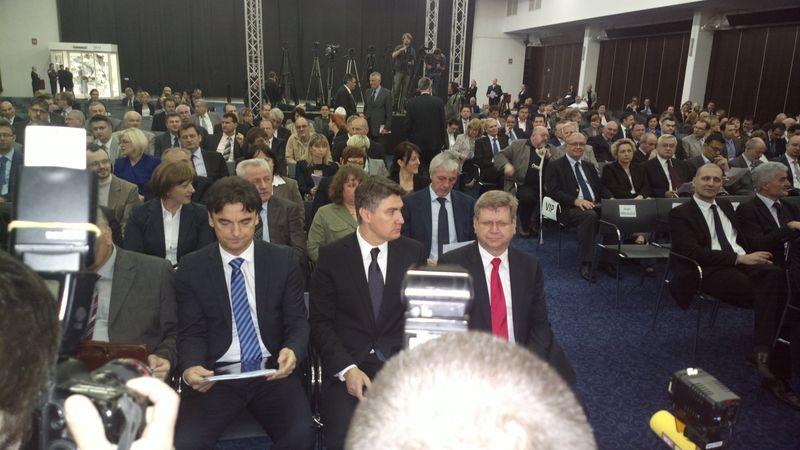 developed European, but also global, economies - Austria, Germany, Italy. He warns, though, that the very membership in the EU is not sufficient to exit the crisis. Much more important are the government's economic policies.
developed European, but also global, economies - Austria, Germany, Italy. He warns, though, that the very membership in the EU is not sufficient to exit the crisis. Much more important are the government's economic policies.
In fact, Croatia is on the edge of a big shift not only from the point of view of what is to happen on July 1st. At least in words, the Zoran Milanovic's government is the first that wants to introduce significant changes and seems a reformist one. More and more often it claims that a major priority of its is introducing rule of law. It seems, this is more important to him than anything else. This, against the backdrop of the challenges EU faces with Bulgaria, Romania and Hungary seems quite ambitious. The economic benefits will follow naturally afterwards. It is a fact that introducing rule of law is difficult and painful. But it is also a fact that this cannot be a single priority. Prime Minister Milanovic complained before employers from the pressure of trade unions and from the way they are twisting the government's hands. However, it is not a leader's business to complain but to find a way to impose what he or she believes in.
Milanovic's beliefs are in the right direction, he only has to succeed in taking the country out of the roundabout. And if we have to look objectively at the results from the first round of the local elections, they should be sending enough signals to Milanovic that he is on the right track. He simply has to stop going round in a circle, watching with fear the trade unions.
 Kolinda Grabar-Kitarovic | © KGK
Kolinda Grabar-Kitarovic | © KGK Jozo Rados | © European Parliament
Jozo Rados | © European Parliament Aleksandar Vucic, Andrej Plenkovic | © Vlada RH
Aleksandar Vucic, Andrej Plenkovic | © Vlada RH